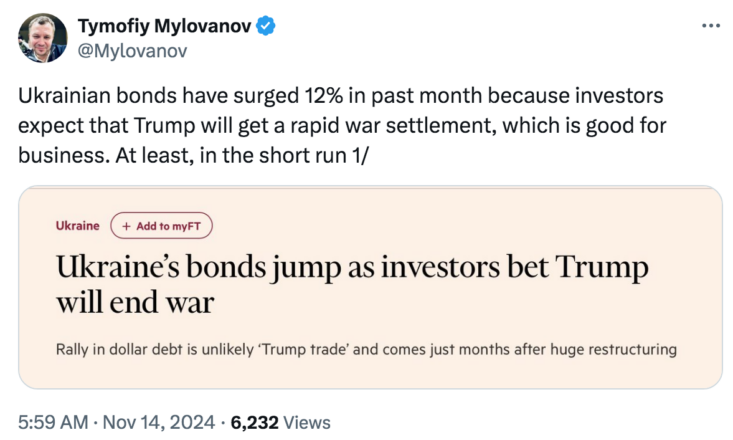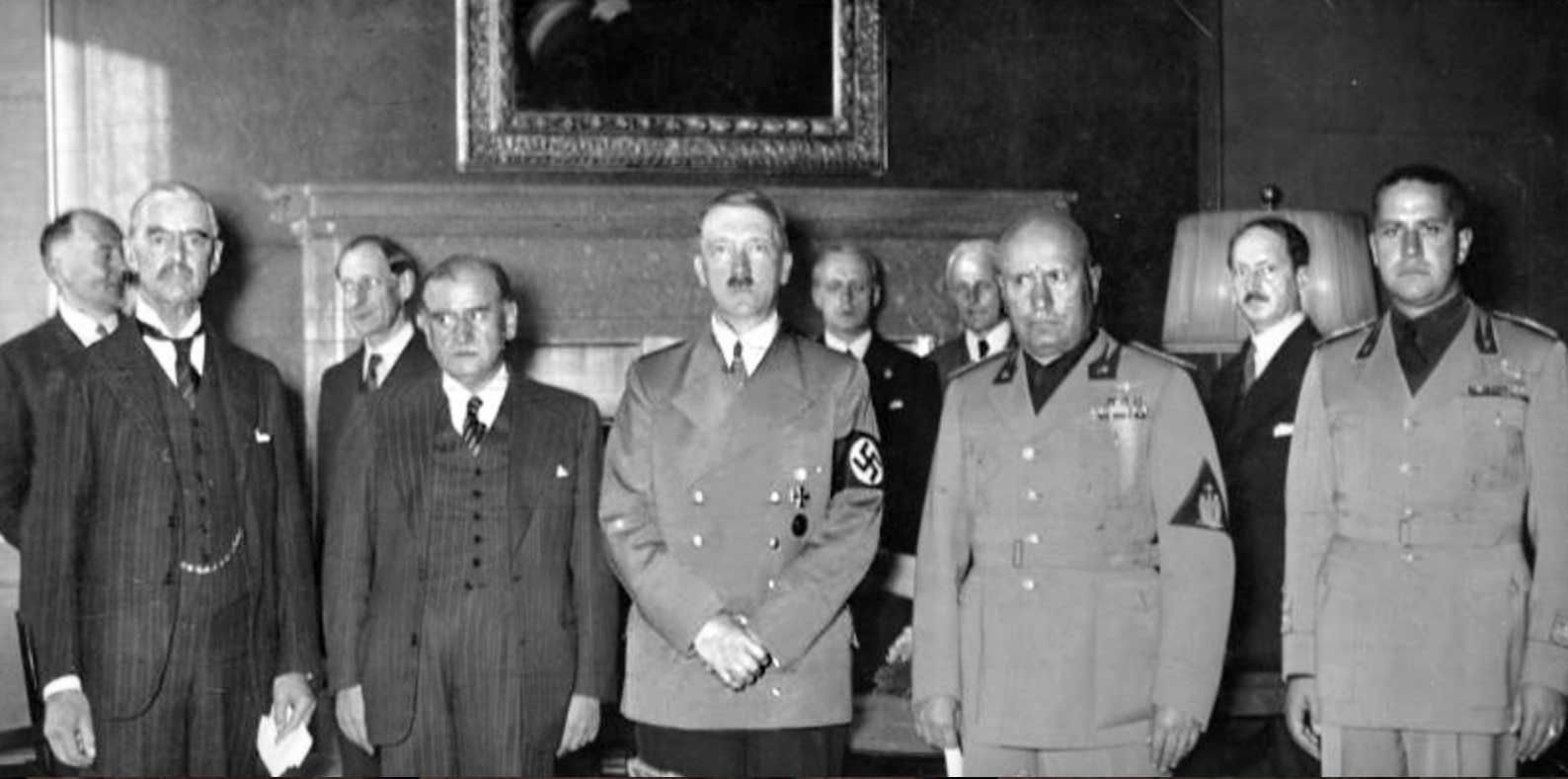In September, 1938, British Prime Minister Neville Chamberlain struck a deal with Adolph Hitler. Britain (and France) would allow Germany to seize the parts of Czechoslovakia that were inhabited by ethnic Germans (the Sudetenland), in exchange for a promise not to make any further advances on the country. Upon returning home, he declared that he had insured “peace for our time.” A few months later, Hitler grabbed all of Czechoslovakia.
In my book entitled The Midas Paradox, I cited a NYT report on the market reaction to the Munich Agreement:
“From a strictly market viewpoint the news of the decision of the Czech Government to capitulate to the demands that it cede the Sudeten area to Germany was favorable. Prices, quite naturally, improved as the threat of war seemed to recede. But this was ‘good news’ with a difference; hardly the sort of good news to capture the imagination of individual traders and evoke a spirit of bullishness. Even in Wall Street, where the mental processes are supposed to be exceedingly realistic, there was a sufficiently powerful sense of the tragedy involved in Czechoslovakia’s surrender and the unhappy role that Britain and France played in bringing it about to dampen the normal speculative impulses.” (NYT, 9/22/38, p. 33)
This happened a long time ago, and I suspect that today very few Americans understand the consequences of appeasing a tyrant who promises that he just wants a portion of a neighboring country.
I was reminded of this market reaction when I read the following tweet:



READER COMMENTS
MarkW
Nov 16 2024 at 7:42am
But the two situation are not really commensurate. In 1938, Czechoslovakia had not already been engaged in a costly, bloody conflict with Germany for 3 years while being supported by western military aid (significantly weakening the fighting capabilities on both sides). And it’s also not clear, even in retrospect, that the Munich Agreement was a mistake — no, of course it did not achieve ‘peace in our time’ but it gave Britain another year to prepare for war. Would Britain really have been better off going to war with Germany in 1938? And the big difference — a direct, major power conflict in Europe then did not pose a risk of nuclear war. At this point, does Ukraine have any realistic prospect of regaining its lost territory without NATO troops joining directly in the conflict?
Danny
Nov 16 2024 at 2:54pm
Well said. This was an exceedingly frivolous Munich comparison.
Mactoul
Nov 16 2024 at 8:29am
Central European borders were defined by the Western Allies to reward their friends and thus it was a folly to weaken these friends by agreeing to revision of these borders in favor of Germany.
Russian-Ukranian border was defined by Soviets as an internal matter of no great import with transfer of Crimea to Ukraine in 1954. Till 2014, the precise position of this border was of no importance to the Western countries. It is still arguable that a border adjustment that would bring lasting peace would be a good thing.
Echarles
Nov 16 2024 at 9:21am
If I’m understanding him correctly, Scott seems to think that Putin will tolerate the evisceration of his military by Ukraine (with arms being supplied by the West) to the point of surrender and humiliation. A nuclear response is downplayed:
“If nuclear war occurs, it will likely be due to a series of miscalculations on both sides”.
https://www.themoneyillusion.com/jeffrey-ding-on-china/#comments
His analogizes to a time when nuclear deterrence didn’t exist, but now that it exists, thinks that capitulating to Putin with Ukraine would create a slippery slope precedent where he would ignore nuclear deterrence and attempt to conquer a NATO country afterwards.
How to factor these possibilities in regards to national interest?
Kurt Schuler
Nov 16 2024 at 8:37pm
Nobody wants Russia to surrender, merely to withdraw to its own borders. And think about this issue like a social scientist: if aggression succeeds, do you expect more of it, or less?
Echarles
Nov 16 2024 at 11:31pm
If you think a successful operation in Ukraine by Russia would lead to more aggression including against NATO countries, then the US should openly declare itself in charge of global border disputes. Taiwan may be next.
Scott Sumner
Nov 16 2024 at 10:37pm
Everyone, The risk of nuclear war with Russia is far higher if they succeed in Ukraine than if they fail. If they succeed in Ukraine, they won’t stop there. Appeasement has consequences.
Craig
Nov 17 2024 at 12:47am
But those consequences are fundamentally different. With respect to WW2, by appeasing Hitler, coupled with subsequent inaction/sitzkrieg post-Poland, the Western Allies faced Germany in May 1940 with a force that was approximately equal, indeed even bolstered with Czech 38(t) {38 is for 1938, the t-designation stands for Tschechoslowakei, the German word for Czechoslovakia} tanks which were excellent early war tanks. Surely the Allies would have been better off fighting a two-front war with the Germans with the Czechs dug into the Sudeten Mountains. Thus. appeasement then had important tactical and strategic consequences when May 1940 rolled around.
If you give Putin the DPR/LPR and Crimea and he violates that agreement, NATO, indeed even NATO without the US, will still vastly outnumber the Russian Army. The potential order of battle is frankly quite lopsided even.
MarkW
Nov 17 2024 at 5:32am
At this point, there’s no prospect of anything more than a Pyric victory for Putin. Their fighting capacity has been so stretched that they’ve had to pull their WWII armor out of mothballs and they didn’t have enough spare capacity to commit to the defense of the Kursk region. In exchange for keeping the territories they now occupy, I expect they’ll have to accept Ukraine joining NATO. And given the ‘success’ of their Ukraine war (and their depleted war machine), who would they try to invade next?
Steve
Nov 17 2024 at 1:15pm
While I think the appeasement argument is overused Putin has said his goal is to re-establish the Russian Empire. There is still territory that is not part of NATO he could invade and it’s not really clear to me that if Putin rapidly invaded a country like Estonia that NATO would really respond. Putin is the one who keeps mentioning nukes and that he will use them if NATO does something he doesnt like.
Steve
Craig
Nov 17 2024 at 3:12pm
” it’s not really clear to me that if Putin rapidly invaded a country like Estonia that NATO would really respond”
I think the Poles surely would of course, but I desperately hope Trump removes the US from NATO precisely because between Estonian territorial integrity and the Yemeni Houthi, these causes are on the long list of causes I have *zero* desire for to sacrifice my son for.
Scott Sumner
Nov 18 2024 at 12:26pm
“You may not care about war, but war cares about you.”
David Henderson
Nov 18 2024 at 2:35pm
I’m not sure how this applies to Craig. He explicitly said that he does care about war.
Craig
Nov 18 2024 at 10:01pm
Its ok, I understand that to mean that war may ultimately wash up on my isolationist shores anyway. Of course my pithy reply would be, “War might care about me because I live in a country that finds it” #peace
Echarles
Nov 17 2024 at 6:37pm
Biden just gave Ukraine permission to strike Russia with long-range US weapons so let’s see how this goes if our missiles start killing civilians and destroying buildings in Moscow.
Craig
Nov 17 2024 at 7:06pm
Not sure but believe the ATACMS don’t quite have that range?
Echarles
Nov 17 2024 at 7:28pm
Looks like 185 mile range so about 300 miles short of Moscow.
Craig
Nov 18 2024 at 10:04pm
Meanwhile Austria still receives Russian gas and I read that Erdogan floated the possibility of a freeze in the conflict.
https://www.newsweek.com/russia-responds-turkey-ceasefire-proposal-ukraine-vladimir-putin-erdogan-1987418
In diplomatic speak I don’t really know what that means, ie is that really just an informal offer where non-Turkey members of NATO can deny making the offer? Or is that an idea floated by the Turks on their own initiative? I don’t necessarily know how to read those tea leeaves.
TGGP
Nov 18 2024 at 8:05am
The NYT article appears to be about markets on Wall Street, while the FT one is specifically about Ukraine. That would seem to me a very big difference!
Echarles
Nov 21 2024 at 8:00am
So now we’re providing landmines to Ukraine and Russia has launched its first ICBM.
Is this the sort of “act tough” escalation that Sumner or others support?
Comments are closed.